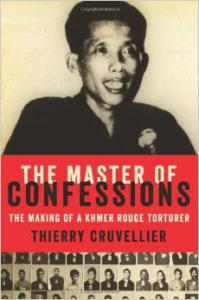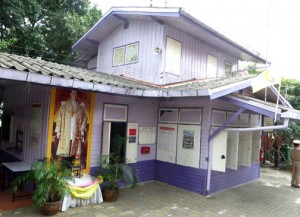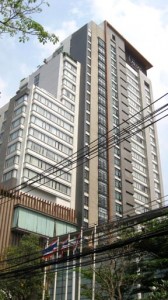 Veteran Bangkok novelist Dean Barrett recently quizzed bargirl Lek on the beginning of the world. It turns out that this college-educated beauty had the whole thing sussed out. We here at WoWasis are printing her explanation, which we assume will soon be a major element in every Thail university’s science curriculum. And you get to read it, right here:
Veteran Bangkok novelist Dean Barrett recently quizzed bargirl Lek on the beginning of the world. It turns out that this college-educated beauty had the whole thing sussed out. We here at WoWasis are printing her explanation, which we assume will soon be a major element in every Thail university’s science curriculum. And you get to read it, right here:
OK. Here, there, topside, bottomside, no hab nothing. No can see nothing. Can say no hab here; can say no hab there. Dark too much. But hab Topside Man. Topside Man Him have power. Can do what him like. Maybe him pay off police. When Him say light can hab, light hab. Him looksee light say, OK! Him happy.
Him say light go there; dark go there; say light day, dark night. So then one, two, three day can hab. Him know how many. And Him say OK now hab water too much. And Him say OK now hab land too much, and hab heaven and land but not same same, and land no hab water. Him like. Him happy. OK.
Him say rice, mango, nam pla, somtam, tom yam kung, can hab. Then hab. Him say OK. Him like. Him make hot season. Him make rainy season. Him make big light for upstair and litten light for downstair and make star too much. Him look, him happy, say OK!
Him say OK now can hab something in water and something can fly over land and him looksee, say OK! Him happy. Him make elephant and water buffalo and cow and chicken and pig and duck and gecko too much. Him say OK now all can boom boom so can make more same same. And more day hab go by.
Then Him say now make puyai in charge look same same Him. He be number one. So Him make puyai from dust. Him say name him Sombat. Then Him make specien garden in Nana and Him say OK you man go garden hab breadfruit, durian, rambutan, mangosteen, appen so many fruit. Can eat. But Him say one tree specien, you no can eat. If eat, you know too much. You be sorry too much. Sombat him think maybe Topside Man dlink too much but him say OK.
 But Topside Man Him see Sombat lonely so Him say Him make somebody keep company for him. Him Make Sombat go sleep and kamoey rib Sombat and make woman for Sombat so Sombat can hab sanuk. When Sombat him wake up, Topside Man say OK you hab her longtime. Sombat looksee woman, Sombat him happy, no care lose one rib, two rib, twenty rib, no care.
But Topside Man Him see Sombat lonely so Him say Him make somebody keep company for him. Him Make Sombat go sleep and kamoey rib Sombat and make woman for Sombat so Sombat can hab sanuk. When Sombat him wake up, Topside Man say OK you hab her longtime. Sombat looksee woman, Sombat him happy, no care lose one rib, two rib, twenty rib, no care.
Woman she happy, her name Noy. Both no hab nothing can wear. Sombat him say to Topside Man, OK, nothing can wear maibenlai, krab, but Noy she begin think about go shopping.
Nana hab one Burmese python, him wicked but plenty smart. Him say to Noy, Why no can eat specien tree? Noy say Topside Man say they die. Serpent say no way. Topside Man Him know if you eat you know too much, same same Him. So he no like; he want be number one. Noy no listen. But serpent, him say, You eat, you say must hab clothes, so you can go shopping.
Noy she like tree, like looksee, like eat, like go shopping, so she eat fruit Topside Man say no can eat and she tell Sombat eat too. Him eat. But then they think no hab clothes specien too much, not like before; Sombat looksee Noy him get big and boom boom Noy. Him happy! Noy happy too – now can go shopping. At first they find frond too much from banana tree and make clothes can wear. But they can hear Topside Man him coming so they hide in bamboo grove.
Topside Man say where everybody go? Sombat say, I no hab something to wear so I make banana leaf to wear and hide myself in bamboo grove. Topside Man him moho too much! Him say who say you no hab clothes? I tell you no can eat specien tree but you no listen! Sombat say not his fault, Noy she give him fruit and Noy say serpent he put her under magic spell, not her fault.
So Topside Man tell serpent because you no listen you allatime got to crawl on ground. Him tell Noy you no listen so Him say from now on when she hab child she hab jeb too much. Nobody tell Noy what mean child so she think maibenlai; but when Topside Man say from now on she must do what Sombat say then Noy pissed off.
And him say to Sombat, You number ten! You listen Noy not me, eat fruit, so now you hab work hard and you someday hab got die. Sombat think nobody tell him what is work, what is die, so him think maibenlai.
Then Topside Man make coats of animal skins for Sombat and Noy, and Noy she very happy. But Topside Man kick their ass out from Nana and they hab plant rice and till ground with water buffalo.
But Noy she still happy too much, she get more clothes later. Sombat him very happy, him get Noy longtime. And they live happily ever after.
*********************
Copyright Dean Barrett 2014




 WoWasis
WoWasis  When Khun Roren installed a “used panty” vending machine just inside the front door of the
When Khun Roren installed a “used panty” vending machine just inside the front door of the  “I’ve really got to refill the machine, we’ve just about been bought out,” Khun Roren continues. The Black Pagoda has become something of a draw for western lesbians, who are among the biggest customers of the panty machine. “But it’s not just the lesbians,” he says. “Western women come in with their boyfriends and buy them as souvenirs. Khun Roren, who sells the packaged panties for 300 baht (about $10 USD) a unit, gives 100 baht of the profit to the dancer, along with a new pair of panties to be worn. “Extra profit for the dancers,” he says. Everyone wins, especially the lady who now has less to do on laundry day. Dancers like Nan think it’s all part of Thailand “sanuk,” and she even flashes a “V” for victory sign, thinking about the additional baht going into her pocket.
“I’ve really got to refill the machine, we’ve just about been bought out,” Khun Roren continues. The Black Pagoda has become something of a draw for western lesbians, who are among the biggest customers of the panty machine. “But it’s not just the lesbians,” he says. “Western women come in with their boyfriends and buy them as souvenirs. Khun Roren, who sells the packaged panties for 300 baht (about $10 USD) a unit, gives 100 baht of the profit to the dancer, along with a new pair of panties to be worn. “Extra profit for the dancers,” he says. Everyone wins, especially the lady who now has less to do on laundry day. Dancers like Nan think it’s all part of Thailand “sanuk,” and she even flashes a “V” for victory sign, thinking about the additional baht going into her pocket.

 Trains leave Wongwian Yai station every hour at varying times. The first train leaves Wongwian Yai at 5:30 in the morning, the final train departs from Mahachai at 7:00 pm. Remember, in Mahachai, the train stops for ten minutes and then returns to Wongwian Yai. Miss the return train? It will return an hour later. You can buy a beer at either station and enjoy your trip. Unbelievably, beers cost 35baht each, while the hour-long train ride costs 10 baht each way. One beer is more expensive than the entire round trip by train!
Trains leave Wongwian Yai station every hour at varying times. The first train leaves Wongwian Yai at 5:30 in the morning, the final train departs from Mahachai at 7:00 pm. Remember, in Mahachai, the train stops for ten minutes and then returns to Wongwian Yai. Miss the return train? It will return an hour later. You can buy a beer at either station and enjoy your trip. Unbelievably, beers cost 35baht each, while the hour-long train ride costs 10 baht each way. One beer is more expensive than the entire round trip by train!